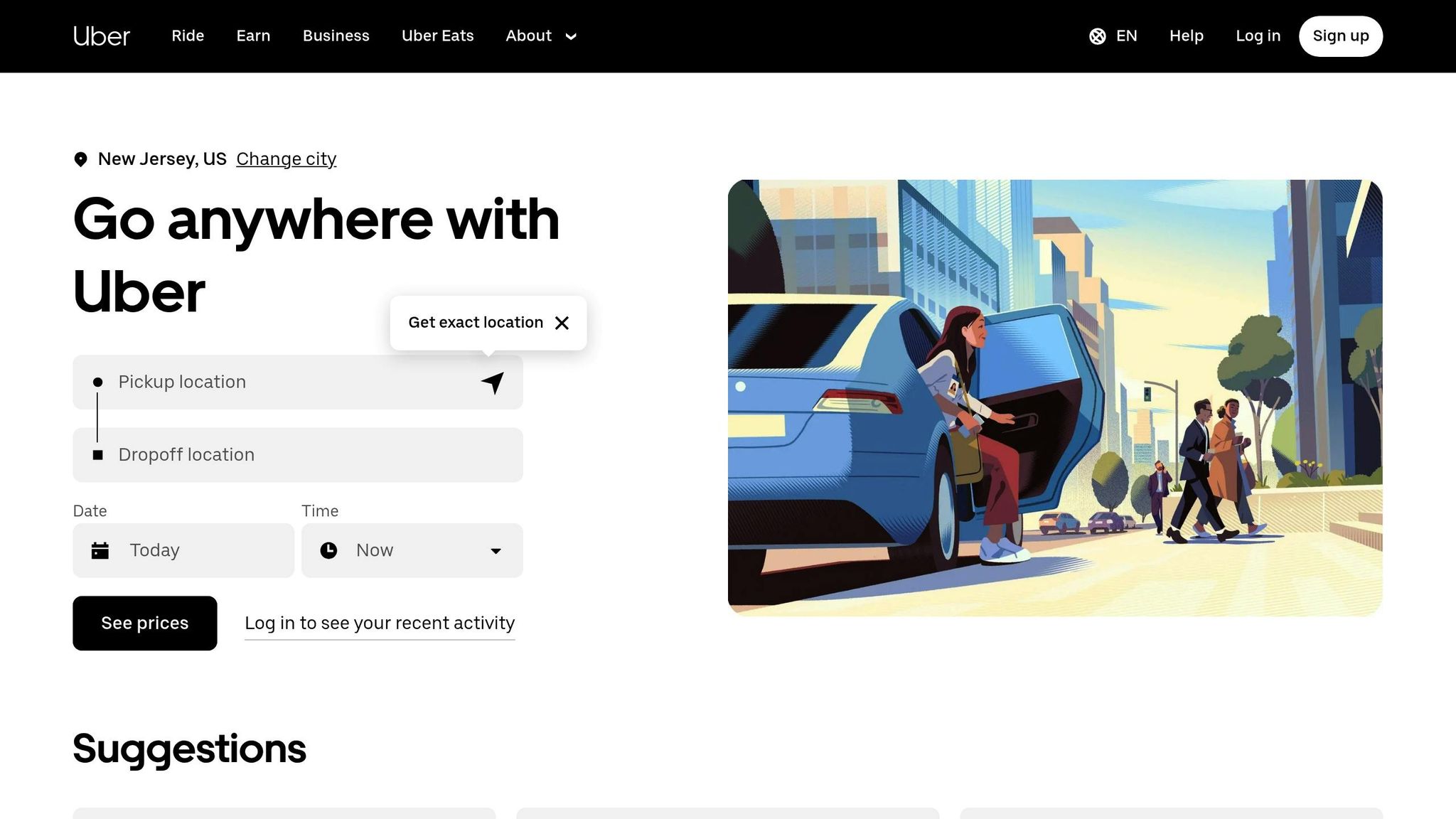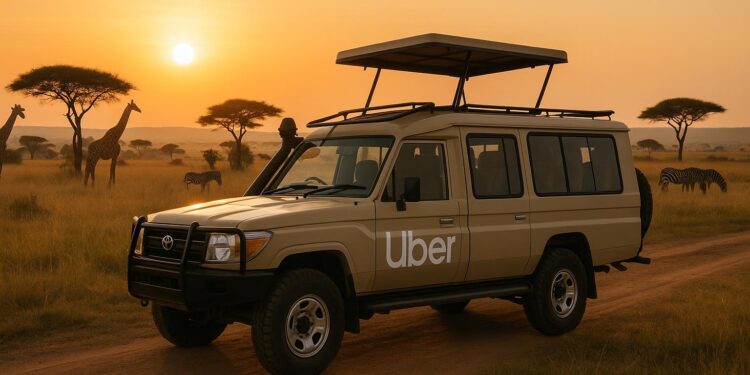Uber Safari is changing how people visit Kenya’s wildlife parks by offering a simple, app-based way to book safaris. It’s designed for convenience, cost-effectiveness, and flexibility, appealing to both tourists and locals. Here’s what you need to know:
- Booking Made Easy: Reserve a day or night safari directly through the Uber app, with upfront pricing and real-time tracking.
- Affordable Options: Prices start at $205 per trip (up to six passengers), with park entry tickets purchased separately.
- Professional Guides: Trips include a licensed guide and safari-equipped vehicle, ensuring a quality experience.
- Key Destinations: Explore Nairobi National Park, Maasai Mara, Amboseli, and more, without the need for long-term planning or expensive packages.
- Local Impact: Supports Kenya’s economy by creating jobs for guides and integrating local operators into the platform.
Whether you’re a solo traveler, a family, or on a business trip, Uber Safari offers a flexible way to enjoy Kenya’s wildlife without the complexities of traditional safari planning.
Uber partners with KWS to tap Kenya’s safari tourism with new service

Uber Safari Features and How to Book
Booking an Uber Safari is as easy as ordering any other ride through the Uber app, but with options tailored for a wildlife adventure. The service is seamlessly integrated into the app, offering safari-specific features to make planning your Kenyan wildlife excursion straightforward. Here’s a closer look at how to book and what makes Uber Safari stand out.
How to Book Uber Safari Step by Step
Booking your Uber Safari takes just a few minutes. Open the Uber app and select "Uber Safari" from the service menu. You’ll have two safari options to choose from: day safaris and night safaris, each offering unique wildlife viewing experiences in Nairobi National Park.
Once you’ve picked your safari type, select your preferred date. Keep in mind that day safaris must be booked at least two days in advance, while night safaris can be reserved up to 90 days ahead using Uber Reserve [1]. Next, confirm your pickup location and the number of guests (up to six). The fare is displayed in Kenyan Shillings, with approximate US dollar conversions provided to help with budgeting.
After confirming your booking, you’ll receive detailed information about your assigned vehicle and licensed guide. Real-time tracking ensures you’ll know exactly when your guide will arrive.
Safari Vehicles and Professional Guides
Uber Safari vehicles are custom safari-equipped Land Cruisers, designed for an immersive wildlife experience. These vehicles come with elevated seating and open roofs, providing excellent views of the park’s wildlife [1]. They comfortably accommodate up to six passengers and meet all safety and environmental standards required within Nairobi National Park.
Your safari will be led by a licensed guide who doubles as your driver and wildlife expert. These guides are thoroughly vetted and trained in Kenya’s ecosystems, ensuring an informative and engaging tour that lasts up to four hours.
Payment Options and Park Entry Tickets
Uber Safari keeps the payment process simple and cashless. You can pay directly through the Uber app using major credit cards, debit cards, or digital wallets [1]. For U.S. travelers, linking your payment method ensures smooth transactions.
The service costs about $205 USD, with prices displayed upfront for transparency. However, park entry tickets are not included in the fare. These can be purchased separately either online through the Kenya Wildlife Service website or at the park gate. The app provides reminders and guidance to make ticket purchasing easy and to help you plan your budget effectively.
Uber Safari Benefits: Cost, Convenience, and Environmental Impact
Uber Safari is reshaping the way people experience Kenyan safaris by making them more accessible, budget-friendly, and eco-conscious. This service tackles common travel challenges while introducing practical solutions that benefit both visitors and local communities. With straightforward pricing, easy travel planning, and a focus on sustainability, it offers a fresh take on the safari experience.
Clear Pricing and Affordability
One of the standout features of Uber Safari is its transparent pricing. No hidden fees, no last-minute surprises – just a clear, upfront cost that’s displayed before you book. This approach eliminates guesswork and ensures travelers can budget confidently. Plus, the per-vehicle pricing structure makes it easier for families and groups to split costs, offering a more affordable way to explore Kenya’s stunning wildlife.
Beyond the pricing, Uber Safari simplifies travel planning through its tech-driven platform, making the process less stressful and more efficient.
Travel Convenience and Flexibility
Uber Safari takes convenience to the next level by offering a seamless, mobile-first experience. Forget juggling multiple vendors or making endless phone calls – everything is handled through the familiar Uber app. You can book in advance to fit your schedule, and real-time tracking keeps you informed about your guide’s arrival.
For international travelers, the English-language interface provides clear instructions on everything from park entry tickets to total costs, making the process straightforward and stress-free. This blend of flexibility and user-friendly design ensures a smooth and enjoyable safari experience.
Environmental Benefits and Local Community Support
Uber Safari’s dedication to sustainable tourism goes beyond just offering a great experience – it actively supports the environment and local communities. By employing licensed local guides with deep knowledge of Kenya’s ecosystems, the service ensures visitors enjoy educational and authentic safaris. The standardized fleet of vehicles is designed to meet strict environmental and safety standards, offering better wildlife viewing while minimizing harm to delicate habitats.
The service also creates meaningful economic opportunities for local communities by providing steady employment for guides and strengthening the overall tourism network. Regular park fees contribute to conservation efforts, while the platform raises awareness about wildlife protection. By promoting responsible tourism, Uber Safari helps manage park capacity and reduce strain on wildlife areas, benefiting both visitors and the environment. It’s a win-win for travelers and Kenya’s conservation goals.
Uber Safari vs Traditional Safari Operators
When planning a safari in Kenya, travelers now have two distinct options: the modern, app-based Uber Safari or the more traditional, consultative approach offered by established safari operators. Each caters to different preferences, particularly when it comes to booking convenience, pricing, and itinerary flexibility.
Booking Process and Pricing Differences
The booking and payment processes are where Uber Safari and traditional operators diverge the most. Uber Safari offers a quick, app-based system for securing pre-set safari packages. Reservations can be made just 2–5 days before departure, making it ideal for last-minute planners. In contrast, traditional operators rely on a more personalized planning process, often requiring bookings up to 18 months in advance during peak seasons.
Pricing is another key difference:
| Feature | Uber Safari | Traditional Safari Operators |
|---|---|---|
| Day Safari Cost | $200 per trip (up to 7 people)[3] | Varies widely based on customization |
| Night Safari Cost | $320 per trip (up to 5 people)[3] | Typically higher, all-inclusive |
| Park Entry Fees | Paid separately via the government portal[3] | Usually included in the package price |
| Pricing Structure | Fixed per trip with transparent costs | Variable and often requires custom quotes |
| Cancellation Fee | $160 for Day Safari and $240 for Night Safari if canceled within 48 hours[3] | Varies by operator and timing |
| Payment Timeline | Full payment at booking[3] | Typically a 30% deposit with the balance due 60 days prior |
Uber Safari’s fixed pricing and straightforward structure appeal to those seeking simplicity and transparency. However, traditional operators offer all-inclusive packages that might include extras like tips or optional excursions, which can sometimes lead to less predictable costs.
Access and Flexibility for Different Travelers
The two approaches also cater to different types of travelers. Uber Safari is perfect for those who want a hassle-free, tech-driven experience with minimal planning. Its fixed itineraries suit people who prefer straightforward, spontaneous trips.
On the other hand, traditional safari operators are better suited for travelers who want a deeply personalized experience. They can create tailored itineraries that include visits to multiple parks, unique activities, and specialized accommodations. However, this level of customization requires more time and coordination, making it less ideal for last-minute planners.
Ultimately, the choice between Uber Safari and traditional operators boils down to what kind of experience you’re after. If convenience and upfront pricing are your priorities, Uber Safari might be the way to go. But if you’re after a bespoke adventure with every detail tailored to your preferences, a traditional operator could be a better fit.
Data Source: [3]
sbb-itb-e5ed0ed
Uber Safari’s Impact on Kenya’s Tourism and Transportation
Uber Safari is making waves in Kenya, bringing fresh momentum to the tourism and transportation sectors. By blending transparent pricing with community-focused benefits, it’s reshaping how locals and visitors experience the country’s iconic wildlife and landscapes.
Tourism Growth and Local Economic Benefits
In 2023, Uber contributed a staggering 14.1 billion shillings ($109 million) to Kenya’s economy, with 20% of that directly tied to tourism. This figure underscores the growing role of digital platforms in boosting tourism revenue and creating economic opportunities.
What sets Uber Safari apart is its integration of local tour operators and fleet partners into its platform. This approach not only drives community earnings but also supports those already equipped with vehicles and safari expertise.
"By opening the platform to local tour operators and fleet partners, Uber Safari creates new earning opportunities for those who already have vehicles and expertise in guiding safaris."
This model builds a bridge between technology and traditional tourism, offering flexible partnerships that benefit local communities while modernizing the industry.
Technology Adoption in Kenya’s Travel Industry
Uber Safari is helping Kenya’s travel sector embrace technology like never before. Through collaboration with the Ministry of Tourism, Kenya Wildlife Service, and the Tourism Regulatory Authority, this initiative highlights how public-private partnerships can drive innovation.
A standout feature of the service is its focus on Nairobi National Park, the world’s only wildlife park located within a capital city. By making the park more accessible, Uber Safari positions itself as a game-changer for both urban residents and international tourists.
The platform simplifies safari planning with its digital tools, offering a seamless booking experience and raising the bar for efficiency in Kenya’s travel services.
"This product is designed to make safaris more accessible and convenient for both local residents and international visitors, while creating new earning opportunities for drivers and communities that rely on tourism." – Imran Manji, Uber East Africa General Manager
As Uber Safari gains traction, it’s inspiring other sectors in Kenya to explore app-based service models, signaling a broader shift toward tech-driven solutions across the travel industry.
Promoting Responsible Safari Tourism
Uber Safari’s digital-first approach is also paving the way for more sustainable tourism. By working closely with Kenya Wildlife Service and tourism regulators, the platform ensures that wildlife experiences remain accessible while promoting responsible tourism practices.
This balance of accessibility and sustainability not only enhances Kenya’s appeal as a travel destination but also reinforces the importance of preserving its natural heritage for future generations.
Guide for US Travelers Using Uber Safari
Planning to explore Kenya’s incredible wildlife with Uber Safari? For US travelers, a little preparation can go a long way in ensuring your experience is smooth and budget-friendly. This guide will help you navigate key differences between US and Kenyan systems, making your safari adventure easier to plan and enjoy.
Currency Conversion and Avoiding Extra Fees
One important tip: turn off Uber’s automatic currency conversion. Why? Uber’s Preferred Currency Pricing in USD adds a 1.5% fee to your fare [6]. While that might sound small, it’s an unnecessary cost. Compare that to most credit cards, which charge around 2–3% for foreign transactions.
For example, if your Uber Safari ride costs 620 Kenyan Shillings (approximately $4.79), selecting the USD option would tack on an extra 1.5%. Instead, go to your Wallet settings and choose "Always pay in local currency." Then, use a credit card with no foreign transaction fees to get the best exchange rate. With the current rate of 1 USD = 129.20 KES, a currency conversion app can help you track costs accurately.
It’s also a good idea to carry some local cash for park entry fees and tipping guides or drivers. Once you’ve sorted out the money side, you’re ready to focus on the adventure ahead.
Adjusting to Local Formats: Time, Date, and Measurements
Kenya operates on East Africa Time (EAT), which is UTC+3. For context, when it’s 9:00 AM in New York, it’s already 4:00 PM in Nairobi. Additionally, Kenyans use the 24-hour clock format (e.g., 15:30 instead of 3:30 PM) and write dates as DD Month YYYY or DD/MM/YY, unlike the US MM/DD/YYYY format.
Distances and speeds are measured in kilometers, not miles. For instance, a 50-kilometer trip to a national park equals about 31 miles. Fuel efficiency is also calculated in liters per 100 kilometers, and speed limits are displayed in kilometers per hour (100 km/h is roughly 62 mph). These differences are small but worth noting when planning your safari routes and timing.
Weather and Packing for Comfort
Kenya’s weather varies depending on location. In Nairobi, temperatures usually range from 50°F to 77°F (10°C to 25°C), while safari spots like the Maasai Mara see highs between 59°F and 86°F (15°C to 30°C). Since local forecasts use Celsius, a conversion app can be handy for planning.
Layers are key for comfort. Early morning game drives can be chilly, so bring a jacket, while breathable fabrics are ideal for warmer midday temperatures. Evenings can cool off again, so packing a light sweater is smart. Keep in mind that Nairobi sits at 5,889 feet (1,795 meters) above sea level, which could cause mild altitude effects for some visitors. Safari destinations like the Maasai Mara vary in elevation (4,900 to 7,200 feet), so staying hydrated and taking it slow on your first day is a good idea.
Kenya also has two rainy seasons: the long rains (March to May) and the short rains (October to December). During these months, sudden downpours can make roads tricky to navigate. Waterproof gear will help you stay comfortable and ready for anything nature throws your way.
Conclusion: Uber Safari’s Impact on Kenya’s Safari Travel Future
Uber Safari is changing the way people explore Kenya’s incredible wildlife. By integrating technology into safari travel, it removes the traditional barriers that have often made African safaris seem exclusive or daunting for many travelers.
This service simplifies the booking process and makes safari adventures more accessible. With features like transparent pricing and instant bookings, it eliminates the need for lengthy planning and large upfront costs. This is a game-changer for independent travelers and budget-conscious visitors looking for genuine wildlife experiences without the hefty price tags that usually come with organized safari tours.
Beyond benefiting travelers, Uber Safari also supports local communities by creating jobs for drivers and guides while contributing to Kenya’s growing digital economy. Its focus on professional standards for guides and high-quality vehicles helps raise the bar for the entire safari industry, encouraging better service across the board.
By promoting efficient routes and shared rides, Uber Safari also reduces the environmental impact of safari travel, aligning with Kenya’s conservation efforts.
For travelers from the U.S., Uber Safari offers a seamless way to explore Africa’s wildlife. The familiar booking interface, clear local pricing, and dependable service make Kenya an even more attractive destination for nature enthusiasts.
Uber Safari demonstrates how technology and accessibility can work hand in hand with authentic safari experiences, paving the way for a new era in East African wildlife tourism.
FAQs
How does Uber Safari ensure a safe and high-quality safari experience in Kenya?
Uber Safari places a strong emphasis on safety and quality by teaming up with licensed tour guides and utilizing top-notch safari vehicles like 4×4 Land Cruisers. This ensures guests enjoy an authentic experience while feeling secure throughout their journey. Every operator strictly follows Kenya’s tourism regulations, maintaining compliance with all necessary licensing and safety standards.
Additionally, Uber Safari works closely with the Kenya Wildlife Service and reputable local tour operators. This partnership helps uphold rigorous safety protocols and guarantees dependable emergency response measures. These combined efforts ensure that every safari is not just memorable but also conducted with the utmost professionalism and care.
How does Uber Safari benefit local communities in Kenya economically and environmentally?
Uber Safari is creating meaningful change in Kenyan communities, addressing both economic and environmental concerns. By introducing greener transportation options, it plays a role in cutting down pollution and reducing the ecological impact in Kenya’s renowned parks and wildlife reserves.
On the economic front, Uber Safari added an estimated $109 million to Kenya’s economy in 2023. This initiative has not only generated jobs in the tourism sector but also opened up fresh income streams for drivers. Beyond that, it encourages skill-building, paving the way for long-term growth and stability within local communities.
How does Uber Safari make safari travel in Kenya more affordable and convenient compared to traditional options?
Uber Safari provides a cost-effective and convenient way to experience Kenya’s wildlife compared to traditional safari services. For daytime guided tours, prices range from $165 to $194 for groups of up to seven passengers. Nighttime rides are slightly higher, costing between $194 and $220. These rates are often more budget-friendly than what you’d typically pay for a traditional safari package.
What sets Uber Safari apart is its ease of use. Travelers can pre-book rides directly through the Uber app, cutting out the hassle of lengthy negotiations or complicated advance bookings. With its streamlined booking process and flexible scheduling, Uber Safari makes it easier for both tourists and locals to enjoy Kenya’s stunning wildlife without the usual stress.
Related Blog Posts
- 10 Weekend Road Trip Routes from Nairobi
- Ultimate Guide to Off-Road Safety in Kenya
- Ride-sharing Regulations in Nairobi: What You Need to Know
- Uber Safari Launches in Nairobi: A Game-Changer for Kenya’s Safari Tourism (2025 Update)




